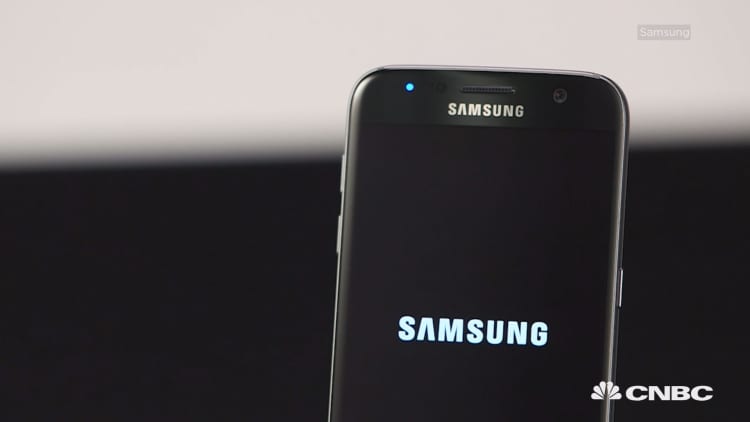
Samsung's new Galaxy S7 and S7 Edge smartphones have features that set them apart from other high-end devices, but luring iPhone loyalists won't be easy, one analyst said.
The new Samsungs feature a 12-megapixel camera that's designed to operate well in low light, a removable storage option in the form of an SD card slot, and, on the Galaxy S7 Edge, a curved edge that displays readable information, even when the phone is placed screen-side down, said Brian Blair, technology analyst and co-founder of Grays Peak Capital.
The Galaxy Edge also has a wider edge with room for things like app shortcuts and news alerts, said Justin Denison, Samsung's senior vice president of product strategy and marketing.
"They've had a very strong user base that has grown, really with every iteration, with every version of the Galaxy that has come out in recent years," Blair said. "A lot of these features are not in the current iPhone and it's unclear if they're going to be in the iPhone 7 this September."
Not surprisingly, Apple has been quiet about the details of its new iPhone. But the tech giant has a loyal consumerbase, which has kept iPhone sales strong.
"Apple remains the dominant smartphone manufacturer in the U.S., butSamsung is catching up," said Harry Wang, director ofmobile product at Parks Associates. "Apple controls 40 percentof the smartphone market, while Samsung has 31 percent and LG is thenext closest rival with 10 percent." according to Parks.
Growth may not be Samsung's biggest challenge, said Blair.
"I think their challenge is not to gain share. They just need to try and hold onto what they have," Blair said. "Samsung has been forced to lower their prices in order to maintain market share, and that has come at the expense of their gross margins. Apple has not had to do that as of yet."
While sales figures are one measure, a brand's image and popularity is another, more nebulous measure and could be Samsung's biggest challenge.
"In terms of popularity, I don't think that Samsung has the ability to beat the iPhone," Blair said.
Samsung has been a dominant player in emerging markets, however, with mid-tier phones priced at $200 to $500, and lower-end smartphones priced at less than $200, according to Blair. And that's where Apple's challenge lies, he said.
Globally, Samsung owned 19.5 percent of the smartphone market,while Apple owned 17.9 percent in the fourth quarter of 2015, according to Counterpoint Research.
But both are facing competition from manufacturers with lower-priced handsets, particularly Chinese manufacturers Huawei and Xiaomi, Blair noted.
Apple did not immediately response to CNBC's request for comment.






